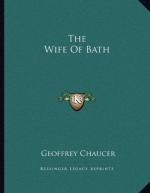|
This section contains 10,874 words (approx. 37 pages at 300 words per page) |

|
SOURCE: Morrison, Susan Signe. “Don't Ask, Don't Tell: The Wife of Bath and Vernacular Translations.” Exemplaria 8, no. 1 (spring 1996): 97-123.
In the following essay, Morrison asserts that, through The Wife of Bath's Prologue and Tale, Chaucer is seeking to authenticate the use of English vernacular as a legitimate language for writing, maintaining that they “can be read as addressing the issues of the vernacular and the role female audiences play in receiving and passing on translations of authoritative texts, as well as vindicating Chaucer's authority as a vernacular author.”
The Friar in his Prologue scolds the Wife of Bath, accusing her of preaching, and exhorting her to let the proper authorities, like himself, carry out an activity which is natural to them. Although he admits that she says “muche thyng right wel” (1273),1 he denies her permission to carry on:
“But, dame, heere as we ryde by the weye, Us...
|
This section contains 10,874 words (approx. 37 pages at 300 words per page) |

|


